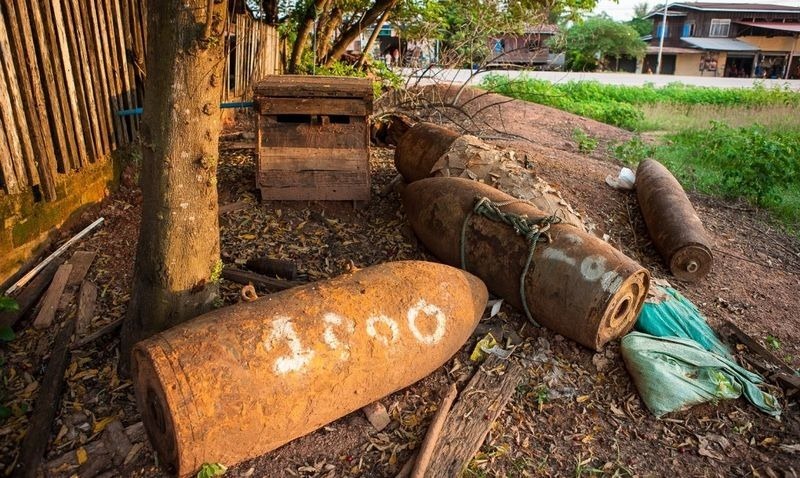The Vietnam War ended 40 years ago, but left a deadly legacy, especially in Laos. The US military dropped more than 2 million tons of bombs on the country during the war between 1964 and 1973, making Laos the most heavily bombed country in the world on a per capita basis. There were more than 580,000 bombing missions on Laos, equivalent to one bombing mission every eight minutes, 24 hours a day, for nine years. Not all of those bombs did what they were supposed to do. An estimated 30 percent of ordnance failed to explode, remaining live in the ground years after the war. They continue to detonate at unexpected places and at unexpected times, such as when children are playing.

Boats made from bomb casings seen in a village in Laos.
A major cause of casualties, however, is villagers attempting to open the big bombs to sell the metal and the explosives inside to scrap dealers. A high quality bomb casing weighing up to 2,000 pounds can fetch more than $100. Empty bomb casings that once contained deadly explosives are visible all across the country in new forms — from hollowed out canoes and containers, to props holding houses above flood.
When photographer Mark Watson took a bicycle trip across the country, he was surprised to see these lethal devices being reused in extraordinary ways. “Scrap from such widespread bombing has been utilized in people’s homes and villages,” Watson said, “for everything from house foundations to planter boxes to buckets, cups and cowbells.”
Gathering bomb scraps is a deadly occupation, but the people were forced into the trade by poverty.
"Lots of agricultural land is denied to people because of the presence of UXO (unexploded ordnance), and this is the main problem. It prolongs poverty because people can't do what they need to do. If they know that UXO is present, they will not plow deeply enough to get a good quality crop," said David Hayter, of Mines Advisory Group (MAG), an NGO working to detect and remove mines and bombs.
But progress is slow and their budget limited. Meanwhile, people continue to get killed and injured by accidental detonation of live ordnance. As of 2012, at least 29,000 people have died from such accidents.

Children pose near unexploded bombs recovered from around the village.

A house in village uses a bomb casing as a garden decoration.

Bomb casing used as a flower pot.

Bomb casings used to prop up a house.

Bomb casings as water container.

Metal recovered from bomb casing shaped into cow bells.

Bomb casings used to prop up houses.


A bomb casing turned into a boat.

Source
